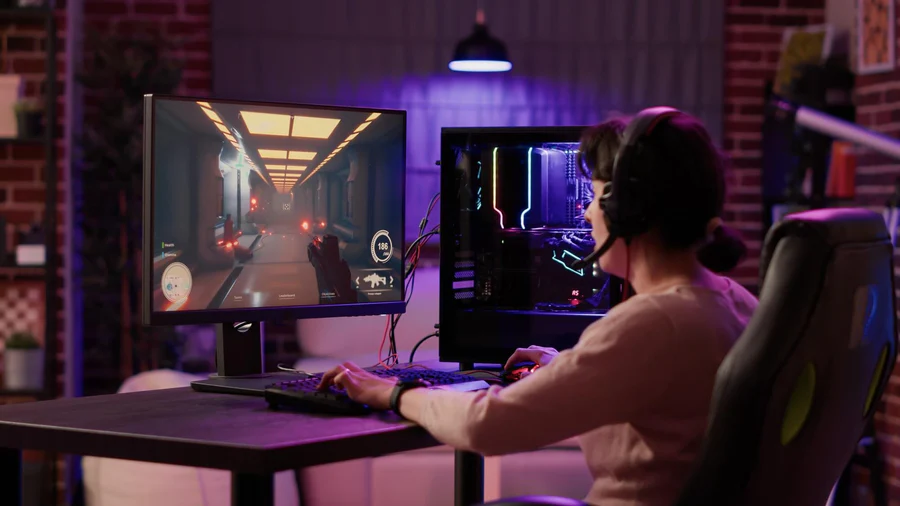If you’re a gamer, you’ve probably been told that upgrading to a faster internet plan will solve all your lag problems. While speed is important, it’s not the only factor that determines how smooth your gaming experience will be. In fact, you could have one of the fastest plans available and still suffer from stutters, freezes, or delayed responses in your favourite games.
Before you start searching for better internet providers in my area, it’s worth understanding the other key elements that affect online gaming performance — and how you can improve them.
Speed vs. Stability
High download and upload speeds are great for quickly downloading games, patches, or streaming content. But when it comes to in-game performance, stability often matters more than raw speed.
Online gaming relies on a constant exchange of small packets of data between your device and the game server. If that connection is unstable — even for a fraction of a second — you can experience lag, rubber-banding, or sudden disconnections.
This is why a 50 Mbps connection with rock-solid stability can outperform a 200 Mbps plan with frequent interruptions.
The Role of Ping
Ping measures the round-trip time it takes for data to travel from your device to the game server and back, usually measured in milliseconds (ms).
- Low ping (under 30ms) is ideal for competitive gaming.
- Moderate ping (30–70ms) is still playable for most games.
- High ping (over 100ms) can cause noticeable delays.
Even with a fast connection, a high ping can make your inputs feel sluggish. This often happens if you’re playing on a distant server or if your ISP’s routing is inefficient.
Latency and Jitter
Latency is the delay between your action and the server’s response. Jitter is the variation in that delay over time. Both can make gameplay feel inconsistent and frustrating.
For example:
- Stable latency: 40ms every time — smooth gameplay.
- High jitter: 40ms one moment, 150ms the next — unpredictable and disruptive.
Jitter can be caused by network congestion, interference, or poor-quality equipment.
Common Causes of Gaming Lag (Even With Fast Internet)
- Wi-Fi Interference
Wireless connections can be disrupted by walls, household appliances, and other devices. - Network Congestion
Multiple devices streaming, downloading, or gaming at once can eat up available bandwidth. - Server Distance
Playing on a server far from your location increases travel time for data. - Outdated Networking Equipment
Old routers or modems may not support current gaming requirements. - Poor ISP Routing
Sometimes your provider sends data through unnecessarily long paths to the server.
How to Optimise Your Connection for Gaming
Go Wired Where Possible
An Ethernet cable provides a direct, stable connection to your router, reducing interference and improving ping.
Prioritise Gaming Traffic
Most modern routers have Quality of Service (QoS) settings that allow you to prioritise gaming traffic over other activities, like streaming or large downloads.
Choose the Right Server
Always select the server closest to your physical location for the lowest ping.
Upgrade Your Equipment
A router that supports the latest Wi-Fi standards (Wi-Fi 5 or Wi-Fi 6) can help reduce latency and jitter, especially if you must play over Wi-Fi.
Manage Network Usage
Ask other household members to avoid heavy internet use during your gaming sessions, or schedule large downloads for off-peak times.
When to Talk to Your ISP
If you’ve optimised your setup but still experience lag, it may be time to speak to your provider. Ask about:
- More efficient routing to the servers you play on.
- Business or gaming-focused plans with lower latency.
- Upgrading your plan if your household uses a lot of data simultaneously.
Some ISPs also offer static IP addresses or premium routing options, which can improve stability.
High-speed internet is an important part of online gaming, but it’s not the only ingredient in a lag-free experience. Stability, ping, latency, and jitter are just as critical — and they can all be improved with the right equipment, settings, and connection choices.
By understanding and addressing these factors, you can make the most of your internet plan and enjoy smoother, more responsive gameplay — without automatically assuming that more speed is always the answer.




